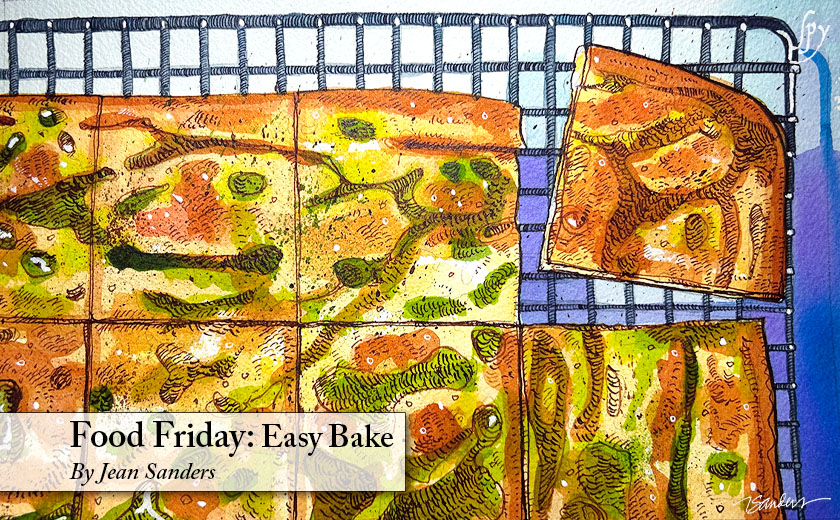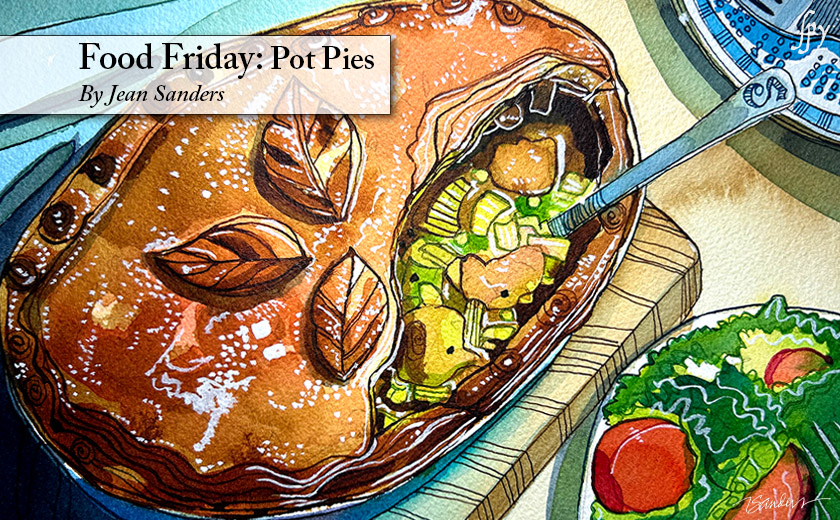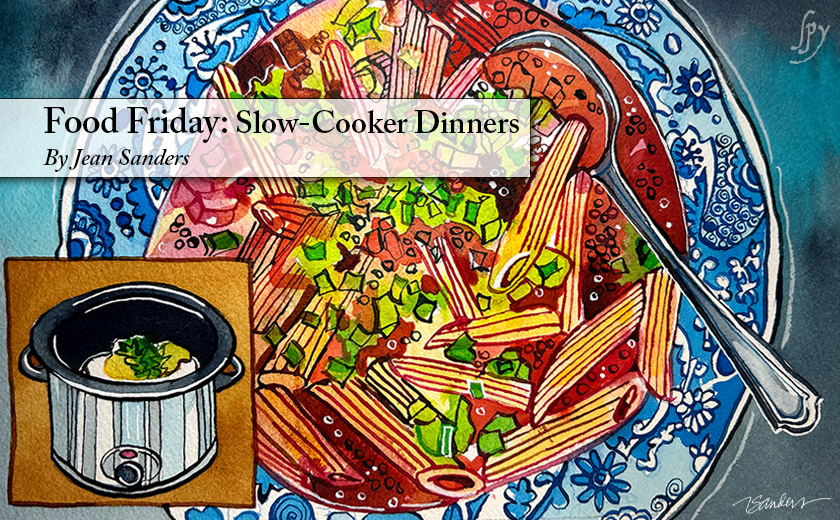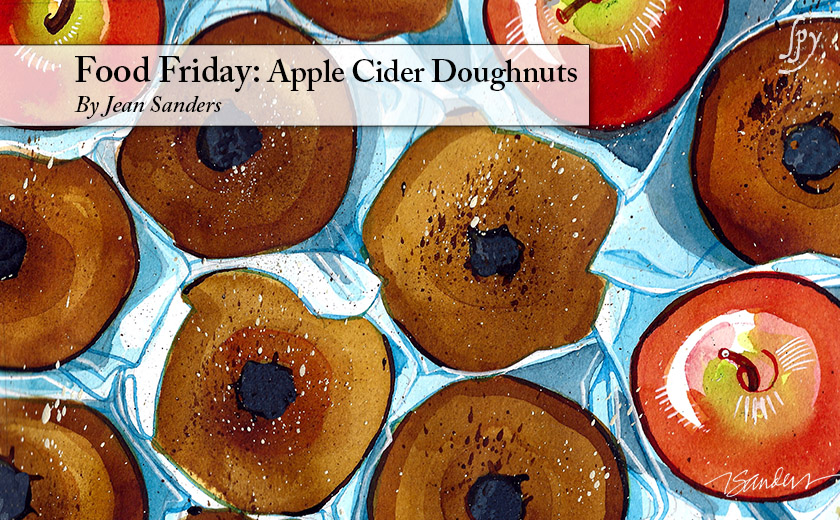
Now that the threat of the nor-easter has swept past us, and there are cooler, clearer days ahead, we seem able to prepare for autumn. I have a new copse of trees out my window – no more dramatic pecan orchard swinging its loose limbs with abandon. Instead I look out at tall, skinny birches and long-legged long-needled pines. Some of their leaves are turning yellow and gamboge as they glisten and sway with dappling light, shuffling cards and dancing in place. I don’t see many of the opportunistic squirrelly boys we had patrolling the orchard, but this weekend I did see a merry band of bluebirds, joyously celebrating their farewell tour. The changes are slow-moving as we wait for summer to finally depart, and for the cool breezes of fall to waft over our fevered brows.
It’s time to do some easy baking; baking that delivers deliciousness for our minimal investment of time (and skill). It’s time for focaccia. Which is sublime when hot from the oven. It is good warm, it freezes well, and can be eaten for any meal. It is deeply satisfying to bake something warm and oozing olive oil and garlic – without all the bother of sour dough starter maintenance that found its way onto every homebound COVID-19 survivor’s to-do list.
Focaccia can be mixed up after breakfast, and ignored until an hour before dinner. Or you can make the dough after watching the Slow Horses, letting it rise over night, to be put it in the oven the next day. Yet, if you are suddenly seized with the yen for warm, home-baked bread, you can start the dough at lunch and hurry it along through the afternoon, and start baking in time for cocktail hour.
The Practical Kitchen We spent this past week experimenting.
Years ago I found a mix for focaccia at our local IGA market and it was a revelation to someone who had grown up on Pepperidge Farm white bread, Levy’s Jewish rye bread and the occasional loaf of freshly baked Italian bread from the red sauce Italian restaurant my family frequented for celebrations. I wasn’t used to warm and crusty, fresh, yeasty bread. During my European interlude I experienced the standard American food epiphany upon discovering baguettes, brioche, pain perdu, naan, crumpets, scones, hot cross buns, challah, pita, ciabatta, and finally focaccia di Recco col formaggio. Translation: my unformed suburban brain was blown.
Moving to the south brought me a deep appreciation for the simplicity of the biscuit. Upon moving further south (though considering Florida “south” is often debated, volubly) we found a wonderful French bakery, and we worked our way through their inventory of baked daily epi breads, baguettes, pain aux chocolate, croissants, and brioche. Jim and Kim’s bakery on Flagler Street in Stuart was deliciously aromatic, and educational.
This week our first batch of homemade focaccia was wrong in so many ways. The pan I used was too small, so the dough rose to epic, cornbread-y heights. Focaccia is considered a flatbread, or a hearth bread, not a voluminous soufflé. I also relied on the recipe, instead of my experience, and merely coated the pan with olive oil. What I should have done was use a larger, shallower pan, (thank you, Food52 for the sheet pan suggestion) and line it first with parchment paper, and then generously coat the parchment paper with olive oil.
The second batch was better, and more attractive. I dotted the dimpled top with halved cherry tomatoes, and a scattering of Maldon salt, finely minced garlic, and fresh rosemary. You can also consider decorating with cheese, basil, or onion. To bask in the glow of the Mediterranean, you could add lemon slices and green olives. For a more abundantly flavored focaccia you could add Prosciutto, mushrooms, green onions, and arugula. If you’d like something sweeter, for a breakfast dish, consider honey, apples, raisins, raw sugar, orange peel or lemon zest.
I aspire to baking airy, crisp baguettes, and hope in time I will master some of the necessary skills. In the meantime, I am content to have spent a week learning about the simple goodness of focaccia. In these perilous times, it is good to ratchet down some of the anxiety with soothing oozy, warm, crunchy, garlicky goodness. And with the stash in the freezer, it is always close at hand.
These are easy – you can start after lunch and have tasty, fresh, piping hot focaccia for dinner. My favorite part was poking the little dimples into the dough after it has risen. And then artfully scattering the rosemary leaves, which I picked from the plant running wild in the container garden. (The rosemary plant has thrived outside even through the past two winters. It is an amazement to me.)
I just loved baking a version of focaccia in our trustworthy cast iron skillet. I’m adding it to the list of good foods that can be prepared in just one pan – always a plus in my book because most of the time I am the designated dishwasher. It was crispy and crusty and tasted divine dipped in a small saucer of olive oil and garlic, salt, pepper, dried oregano and basil. It is practically a meal unto itself. Add salad and wine, and if you are being really pesky, a protein. Mr. Sanders and I gobbled up half a pan, which left half a pan to go in the freezer, that we hauled out delightedly a few nights later. Food in the freezer = money in the bank and less prep time. More time to paint the back porch, or weed the lettuce bed, or watch the blue birds soar through the shimmering, pointillistic autumn leaves.
“The smell of good bread baking, like the sound of lightly flowing water, is indescribable in its evocation of innocence and delight…”
—M.F.K. Fisher
Jean Dixon Sanders has been a painter and graphic designer for the past thirty years. A graduate of Washington College, where she majored in fine art, Jean started her work in design with the Literary House lecture program. The illustrations she contributes to the Spies are done with watercolor, colored pencil and ink.





